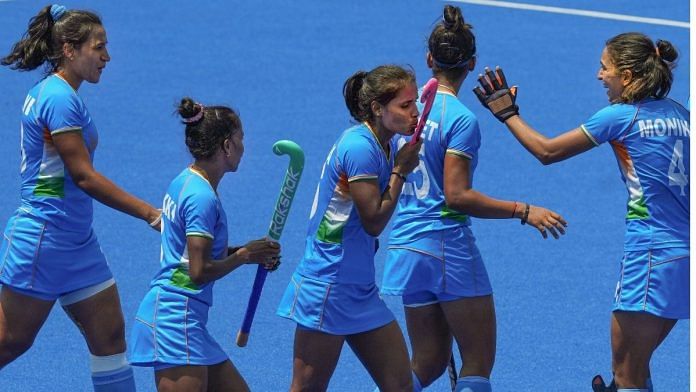There was a lot of praise for India’s women’s hockey team for its stellar run at the Tokyo Olympics. Prime Minister Narendra Modi even had a telephonic conversation with the players and coach after the team lost the bronze medal match to Great Britain, telling them not to be disheartened. He especially mentioned Vandana Katariya. But from ministers to sporting authorities to Hockey India, all maintained complete silence when Katariya, a Dalit, faced casteist attack after the team’s semi-final loss to Argentina.
This is similar to how the boxing federation and Sports Authority of India chose to watch in silence as Chennai boxer Thelasi Helen, also a Dalit, faced caste-based and sexual harassment. Though different, the Board of Control for Cricket in India (BCCI) also had nothing to say on the attack on cricketer Mahendra Singh Dhoni’s house after India’s exit from the 2007 World Cup in the group stage.
There is a pattern here – sporting authorities and organisational bodies will rarely ever speak up when their players become victims of the fans’ proverbial wrath.
Grateful to all those people who came forward in my support ? the fake accounts have now been suspended by @twitter
— Vandana Katariya (@VandanaHockey16) August 7, 2021
This is unlike English football, which came out in full public support and denounced the racist abuse faced by its three Black players after England lost the final of the UEFA European Championship 2020. From captain Harry Kane to major English clubs to even UK Prime Minister Boris Johnson, all made a point to send the message across that they stand by the players from the minority groups.
But the picture in India is a complete contrast. In the latest incident, a group of ‘upper’ caste men from Katariya’s locality in Haridwar ‘celebrated’ India’s loss by bursting firecrackers and abusing her family members with casteist slurs. The Haridwar police has arrested three men after the family filed a complaint. But it is the silence of Hockey India and sporting authorities that proves once again how discrimination in Indian sports will continue to go unacknowledged.
Vandana Katariya's brother & aunt say their upper-caste neighbours celebrated India's loss, hurled casteist abuses & humiliated them. They also robbed their house before. Vandana's family say they will self immolate & die by suicide if the casteists aren't punished! Heartbreaking pic.twitter.com/55ejoHcAd9
— Sankul Sonawane (@Sankul333) August 5, 2021
India’s Bahujan society realises this, and is willing to call this ‘culture’ out. An Ambedkarite forum has written to the International Olympic Committee (IOC) to “pass a condemnation notice…for their silence”.
A letter to @Olympics committee to pass a condemnation notice to the Government of India and Hockey Team for their silence on caste discrimination with Oly star Vandana Katariya. @iocmedia #CrushTheCaste pic.twitter.com/wMYEmpdAjw
— Mission Ambedkar (@MissionAmbedkar) August 5, 2021
Indian women’s hockey captain Rani Rampal was perhaps the only leading figure to speak up against the casteist slurs hurled at Katariya and her family, calling it “a shameful act” and reiterating the team’s motto. “When we come out to play, there is only one thing we work hard for, that is India,” Rampal said during a virtual press conference.
Also read: Caste, ethnicity, religion – United colours of Indian hockey prove the game thrives in inclusivity
Different games, same protocol?
In 2007, when India lost to Bangladesh in its opening ODI match in the World Cup by five wickets, many cricketers, including then-skipper Rahul Dravid, Virender Sehwag and Mahendra Singh Dhoni, became victims to the proverbial wrath of a cricket-obsessed nation.
Dravid’s effigies were burnt. Sehwag was subjected to sloganeering. An enraged mob broke into Dhoni’s under-construction house in Ranchi after he was bowled out for a duck.
Despite the provocation, Dhoni remained calm and did not issue any statement. Nor did anyone from the BCCI or any senior authority.
Years later in 2016, ahead of the release of his biopic MS Dhoni: The Untold Story, the former Indian captain admitted to having felt like a “murderer or terrorist” seeing the welcome the Men in Blue received upon arrival after being knocked out of the tournament. Even then, the authorities chose to side with silence.
Did the BCCI not speak up fearing public backlash? Or is it the expectation from a player that all of this is a part of the package? Whatever it may be, their silence speaks for itself.
Also read: English football has to realise — just tweeting against racism isn’t going to be enough
Journalists should change the norm
While it’s worthwhile to cover the success story of Indian women hockey at Olympics, journalists must also question Hockey India and the Ministry of Youth Affairs and Sports on their silence on caste discrimination against Katariya and her family.
After all, success in sports is no shield from the deep-rooted casteism in society – or Katariya, the first-ever hat-trick scorer for the Indian squad in the Olympics, wouldn’t have had to face the attack from the ‘upper’ castes.
By winning glory for the country, Indian athletes are doing their bit, with those from the oppressed castes left to fight more than just the physical battles. It’s high time the authorities owned up their responsibility too.
A word of support for the athletes could go a long way in discouraging fans from turning into harassers or a threat. Indian sports failed Dalit sportspersons like boxer Thulasi Helen and cricketer Vinod Kambli in the past; it should stop adding to its list of failures and come out with a resolve to show the country and the world that there is no room for discrimination, even if it can’t warm up to the idea of Dalit representation yet.
Views are personal.
(Edited by Prashant Dixit)



